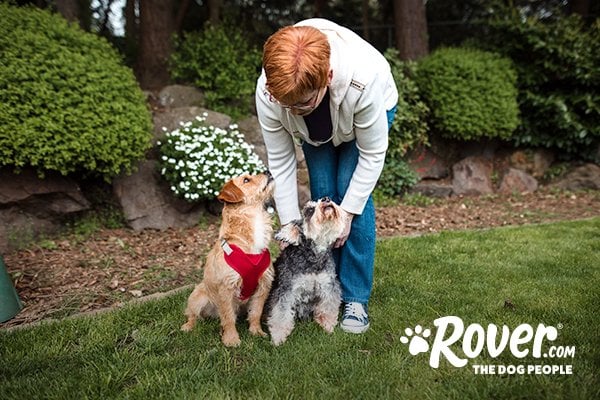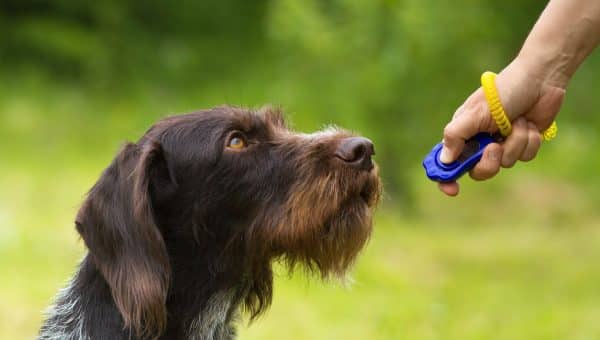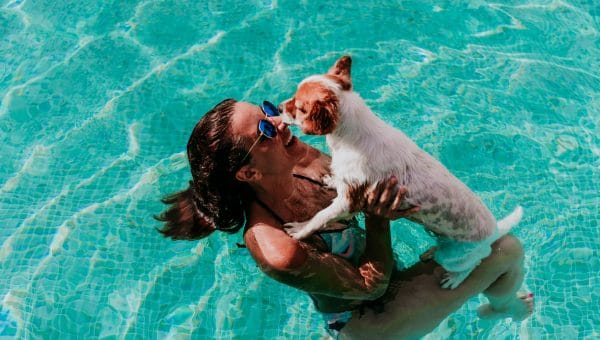- This post contains affiliate links. Read more here.
Sitting at a cafe the other day, I overheard one of the staff lamenting her dog’s behavior. “He’s totally potty trained,” she said, “but whenever I’m away or not paying attention, he pees in this one corner of the living room.” When a dog is housebroken 95% of the time, how do you prevent accidents that other 5% of the time?
Potty Training an Adult Dog
A dog that has accidents a few times a week or only in one location is not fully housebroken.
When it comes to potty training, there’s very little difference between training a puppy and an adult. The biggest challenge is ourselves—it’s hard to accept that a dog that only has accidents a few times a week or only in one location is not fully housebroken.
But the truth is, if you’re getting regular accidents indoors, there’s something about the concept of potty training that your dog simply doesn’t understand.
Unless you have a senior dog experiencing issues of incontinence* or Canine Cognitive Dysfunction, your best bet is to spend some time on potty training basics to make sure your dog is on board.
How to House Train an Older Dog
Follow these three simple rules for happy housebreaking!
Celebrate and reward when your dog toilets in the appropriate location.
- Cheerlead with a happy voice immediately after your dog has completed the act. Carry around some treats in your pocket to sweeten the celebration. The feedback must be instantaneous; if you wait until you return home to celebrate and reward, your dog won’t understand why.
- If your dog is allowed to potty in the yard, make sure to celebrate them there, too—not just on walks. Clarify every location they are allowed to go.
The feedback must be instantaneous.
Catch your dog in the act of having an accident and remind them where they’re supposed to go.
- This is a very important piece of the puzzle to your dog’s understanding of housebreaking. If you see your dog peeing or pooping in the house, immediately make a noise to interrupt and get their attention (for example, “Uh uh!” or clapping your hands).
- Quickly go to your dog and gently take them to the correct outdoor location. Hover in that correct location with your dog for a couple of minutes. If they start going again, celebrate and reward. If they don’t, return inside and clean up the mess.
- Clean up the mess using an enzymatic cleaner like Nature’s Miracle, which will dissolve the pheromones that a regular household cleaner won’t remove. Dogs tend to return to locations where they smell those pheromones to urinate or defecate again.
- Don’t yell or chase your dog when you catch them having an accident. If you’re too scary, your dog may actually have more accidents.
- Don’t punish your dog for an accident you don’t see happen. By the time you find the accident, they will forget they’ve done it at all! All you can do is clean up the accident and try to catch the next one.
Don’t punish your dog for an accident you don’t see happen.
Supervise, supervise, supervise
- If you’re not watching your dog, prevent them from entering carpeted rooms or from accessing the plant they always pee on. Confine your dog to a safe space where an accident won’t matter, like a bathroom or kitchen with a tile floor, an X-pen or a crate.
- If your dog has an accident in that confinement space, it’s ok. Teach them first that everywhere else in the house is off-limits for peeing and pooping first. Once they’ve learned that, it will be easy to generalize the information to the final confinement location.
- If your dog consistently pees or poops in the same location, block that location with a piece of furniture until your housebreaking is complete. When you are ready to remove that piece of furniture, only do so when you are present and watching your dog.
- If you’re hanging out and supervising your dog, block access to other rooms so that they can’t sneak into another room and have an accident that you might miss.
Additional tips for potty training an adult dog
- If you are using potty pads, resist the urge to spread them out all over the house or in all of the locations your dog has peed before. Place them in one location, and one location only.
- Putting your dog on a potty schedule can be helpful. Dogs have an excellent sense of time, so once they start to catch on to the rules, they’ll know they have a potty break coming up.
* If you have a senior dog with toileting issues, the problem may be beyond their control. Don’t despair! Belly bands can make the problem tolerable.







